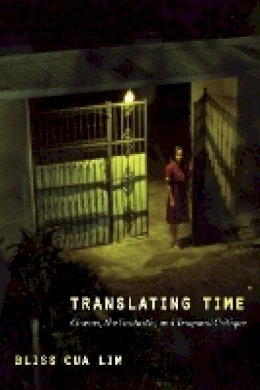
Translating Time: Cinema, the Fantastic, and Temporal Critique
Bliss Cua Lim
In Translating Time, Bliss Cua Lim argues that fantastic cinema depicts the coexistence of other modes of being alongside and within the modern present, disclosing multiple “immiscible temporalities” that strain against the modern concept of homogeneous time. In this wide-ranging study—encompassing Asian American video (On Cannibalism), ghost films from the New Cinema movements of Hong Kong and the Philippines (Rouge, Itim, Haplos), Hollywood remakes of Asian horror films (Ju-on, The Grudge, A Tale of Two Sisters) and a Filipino horror film cycle on monstrous viscera suckers (Aswang)—Lim conceptualizes the fantastic as a form of temporal translation. The fantastic translates supernatural agency in secular terms while also exposing an untranslatable remainder, thereby undermining the fantasy of a singular national time and emphasizing shifting temporalities of transnational reception.
Lim interweaves scholarship on visuality with postcolonial historiography. She draws on Henri Bergson’s understanding of cinema as both implicated in homogeneous time and central to its critique, as well as on postcolonial thought linking the ideology of progress to imperialist expansion. At stake in this project are more ethical forms of understanding time that refuse to domesticate difference as anachronism. While supernaturalism is often disparaged as a vestige of primitive or superstitious thought, Lim suggests an alternative interpretation of the fantastic as a mode of resistance to the ascendancy of homogeneous time and a starting-point for more ethical temporal imaginings.
Product Details
About Bliss Cua Lim
Reviews for Translating Time: Cinema, the Fantastic, and Temporal Critique
Teresa Rizzo
Media International Australia
“From my perspective, Bliss Cua Lim’s Translating Time is one of the most exciting contributions to film studies in a while, and a welcome addition to the growing number of Asian horror/ghost/fantastic film genre analyses. Yet it is so much more, because it is also an ambitious intervention in the literature on film and time. . . . Translating Time is an important challenge to certain ways of understanding duration. . . . It is therefore a ‘must-read’ for film scholars of all sorts, not only those us interested in Asian cinema. . . . Any work committed to understanding cinema as an art of time would do well to take on board Lim’s insights.”
Chris Berry
Screen
“Lim's culturally specific readings of ‘fantastic’ Asian film make for a wholly original way to talk about cinema's temporal ontology. Summing Up: Recommended. Lower-division undergraduates and above.”
S. C. Dillon
Choice
“One of the remarkable aspects of Lim’s research as a film scholar is her breadth of knowledge in philosophy, history and cultural studies—all of which she brings to bear on cinema. While Lim draws on a wide swath of film research, she uses it to totally original ends. . . . Lim’s deep, thoroughly researched, and intelligent book attests to her creativity and originality. She brings a wide range of theories to bear on her chosen cinematic mode of the fantastic, and in the process illuminates problems of time, colonialism, postcolonialism, film genre, and the global reach of Hollywood’s cinematic industry machine.”
E. Ann Kaplan
Cinema Journal
